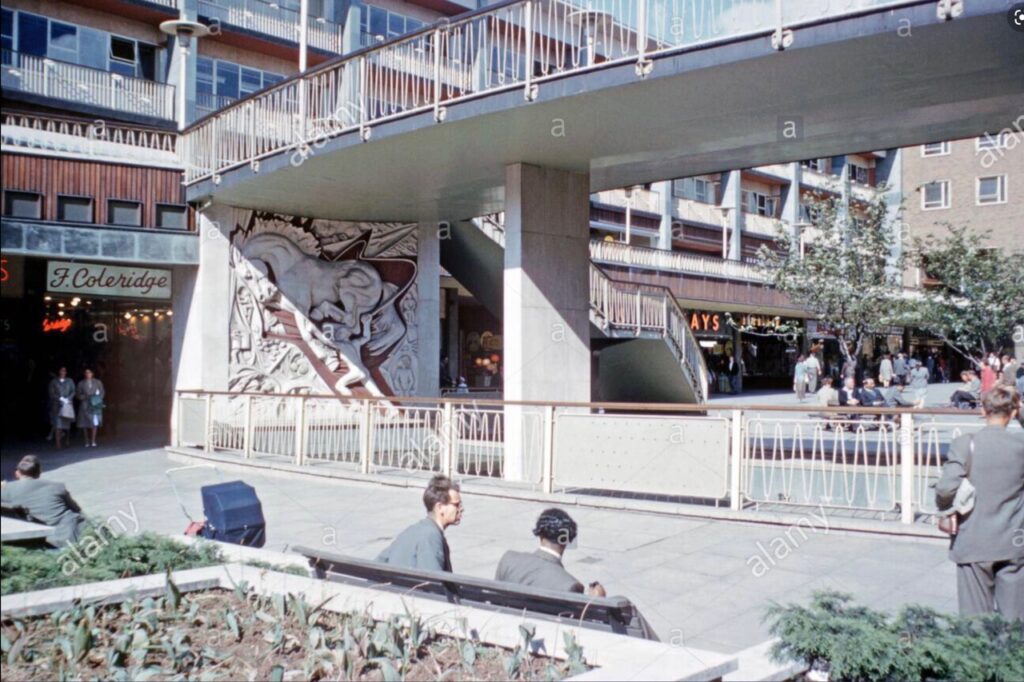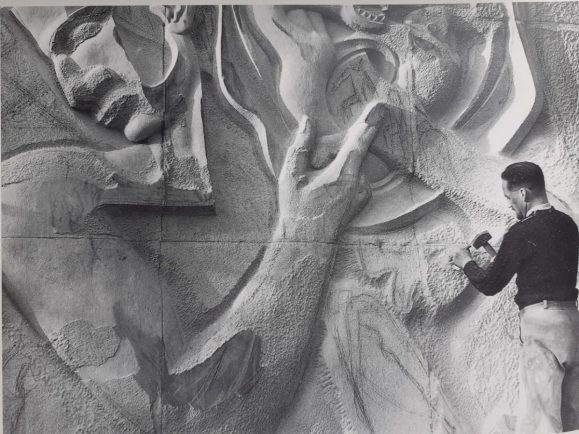Walter Ritchie
Homepage » Walter Ritchie
Walter Ritchie – Man’s Struggle

On the side of the Herbert Art Gallery and Museum in Earl Street, almost facing the Ellen Terry building, are two carved stone murals by Walter Ritchie. They are called ‘Man’s Struggle” but they have not always been located here. They were originally located in the middle of Coventry’s Upper Precinct. The sculptures were unveiled in 1959 and faced each other over a pool of water with fountains under a pedestrian bridge.

Coventry Society’s Vice Chairman, Paul Maddocks, recalls “As a lad I grow up admiring them. Looking through the railings up at the sight of the man trying to hold on to a large horse, it was a powerful image. It reminded me of a cowboy! The other picture was more frightening. It had a large head and a ramp with men and animals being lead to what looked like Hell, with great big gnashing teeth.”

“As I grew up I started to notice more of the detail and grew to love it, along with the new precinct. Being a teenager in Coventry in the 1960’s, it felt like living in the centre of a new world. Everything was new and modern; everyone worked in some of the best paid jobs in the land; new pedestrian traffic free shopping areas; new works of public art; new housing estates and the great, new Cathedral. People from around the world were coming to see this new utopia, and the Coventry born artist Walter Ritchie’s reliefs were a major part of this New World.”
The two works of art are both represent “man’s struggle”. The first is the struggle with the outside world: to control the physical things like nature and the environment such as taming and controlling a wild horse. There are representations of a man working, a coal-miner drilling, a man climbing a ladder, a man carrying a container on his back, surgeons performing an operation, while all around are magnified blood cells and plants, together with a rocket and shock waves.

The second artwork is man’s struggle within himself; man’s mind is opened to reveal his thoughts and the past is shown moving through his mind and on into the future. Other images show death with Hamlet looking down on to the skull contemplating death and it symbolises man’s search for philosophy. A man playing a violin representing music, the Good Samaritan bandaging a man’s head. As long as Good win’s over Evil Man has a future.
Gill Bayliss wrote to tell us that her sister, Val, took her horse to Walter at his house in Kenilworth to be used as a model for Man’s Struggle. She visited him many times so that he could do sketches for his groundwork. The horse was a chestnut mare named Sheena and she was an ex race horse.
In the early 1990’s when the Precinct was having a refurbishment, the two works of art were moved and put on display outside the Herbert Gallery in 1994. This was the first time you could see them side by side. It is well worth getting up close to them and you get a better idea of how big they are and how the stone relief works.

Walter Ritchie was born in Coventry on 27th April 1919. The son of a car painter, he was initiallly trained at Art School and then by local masons at a stone quarry near Banbury. “They taught me how to hold a hammer and chisel, also the crowbar, a most useful tool.” At 18 he was commissioned by Warwickshire County Council to sculpt a mermaid riding a seahorse, however the Council didn’t accept it. Walter was a pupil of Eric Gill between 1938 and 1939 where he fully developed his art.
In 1953 Coventry City Council commissioned him to do the two large Portland stone reliefs of ‘Man’s Struggle’ in Coventry Precinct (created between 1954 and 1959). He did many other works including the ‘The Creation’ a series of large carved brick relief panels at Bristol Eye Hospital (created between 1981 and 1986).

The five massive carved-brick reliefs each measure 5’7” by 12’. The material was Ibstock Red Marl brick. When installed, these panels were the largest non-reinforced brick reliefs ever carved.
Walter also did a wooden sculpture the ‘Dove’. This was used for a mould to make a bronze sculpture for Richard Lee school as a symbol of peace. The sculpture was donated to the school by Richard Lee’s family. Walter would have known them through the Peace Pledge Union. It was the only piece of his work that was cast in bronze. When the wooden dove was returned to Walter it was seen in his workshop by Arthur Ling, the then City Architect, and purchased for the Belgrade Theatre. It was first displayed beside the stage but later moved because it was distracting the audience. The original wooden Dove is now on the stairwell in the Belgrade Theatre.
Its interesting that on the Man’s Struggle to control the world inside himself on the bottom right hand corner is the hand of God creating Adam, beginning with the pelvis and hip joint and the bones and flesh are shown growing into the complete man, a very difficult thing to do in stone.

The wooden Dove in the Belgrade Theatre, The Dove at Richard Lee School and the birth of Adam by the hand of God on the Man’s Struggle mural.
Walter moved to Kenilworth in September 1940 because of the boming in Coventry. He shared a house with an Architect and his wife who found that the house they were renting was rather large for just the two of them. He lived for 57 years in in Kenilworth. He took a holiday once, in 1953, when he went to the Lake District after a very strenuous time looking after his father. But he only stayed three days because he caught flu and came home. He never took one again, having been alarmed by the financial insecurity he saw at first hand when he worked with Eric Gill.
He did many other works of art around the area including Alice in Wonderland – Binley Woods Primary School, Boy with Horse – Bilton Primary School, Hurdlers and Climbers – Water Orton Road, Park Hill School and many more. He died in Kenilworth, on 12th February 1997 aged 78.

Walter Ritchie, with his hammer and chisel, working on Man’s Struggle

‘Hurdles and Climbers’ relief sculpture at Park Hill School.
